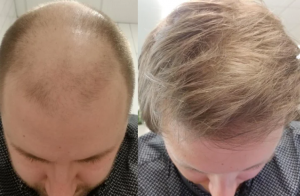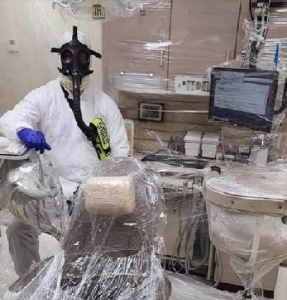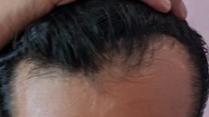This is a good review of topical vs systemic finasteride: https://www.ncbi.nlm.nih.gov/pmc/articles/PMC6609098/
I had a few questions about hair transplants (fue)
In my donor area, does each graft contain several follicles?
For the transplant area, does the doctor usually implant several follicles per graft? I had someone describe that for the first 3 rows, she would put 1 follicle each per graft. Then the following rows would be 3 per graft. She explains that it would look more blended in. How do most other surgeons do it? Do the follicles vary per graft to make it look more natural? thanks
As the pioneer of follicular unit transplantation and FUE, I have studied the follicular units for some time. Everyone has a different hair count in their follicular units. Caucasians from Europe usually have the highest hair counts (between 2-4 hairs per follicular unit), Asians or people from middle east like Arabia, have lower hair counts (between 1-2 hairs per follicular unit). Of course, cross breeding has changed it so that if you have a mixture of ancestry, the number of hairs per follicular unit can reflect an ancestor’s numbers rather than your ethnic average. If a doctor puts multiple follicular units in a graft, it will look pluggy (not normal).
A little explanation of what I have done to make this happen.
Two years ago, I realized I was transgenger (MtF), and I immediately started doing whatever I could to try and get my hair back. I started finasteride in January of 2018, and started in using Minoxidil at the same time. In July 2018, I started feminizing hormone replacement therapy, which includes a testosterone blocker, spironolactone, and estrogen, estradiol. Then in October 2018, I switched from finasteride to dutasteride, since my body is still producing some testosterone, as everyone does. I have been growing my hair since just before New Year’s day, with a few trims to prevent any awkwardness. Some of the hair that has been revived has also come back blonde, which I think is a little interesting.
I just thought this was something that was miraculous, and while this sub is predominantly men, I figured this recovery would be appreciated. Yes the hormone therapy has been a huge part, but I still wouldn’t be at this point had it not been for the information I discovered on this sub.
I’ve had an FUE (I’m in my younger 30s) and I’m wanting to increase central density and add to some weak spots/refine near the hairline. I’ve been thinking about 1500 or 2000 grafts, the FUT clinic recommended 2500 which I balked at some and then suggested that I could get by with 2k grafts. I am worried about depleting the donor zone too quickly though, I also like the idea of starting smaller and seeing how I like the result (I also like the price of less grafts haha).
Is it a bad idea to do just 1500 grafts at once with FUT? Would I loose out on harvesting those 500 grafts or could I just get them in the future if I decide to do another FUT? Has anyone had a 2nd FUT where they harvest and put the second scar in the same spot as the first? How did that go, did you like or dislike anything about that method or do you prefer two scars?
You need a Personalized Master Plan which starts with basics such as your original donor density and hair mass index. The number of FUE grafts removed in the first procedure plays an important role in these calculations. These factors will allow you and your doctor to calculate your lifetime donor supply so that you will know the answer to the question you posed. Read this post on this very subject: https://baldingblog.com/a-master-plan-and-a-second-hair-transplant/
I started fin in November 2018 with 1mg per week, increased to twice per week in April 2019 and then to every other day in November 2020. So far I’ve seen hair loss continuing through that whole period. I did a few blood tests and I have naturally low DHT. I got tested after taking fin 2x per week and it was lowering my dht levels
I’ve been using minoxidil since 2016 and initially I didn’t experience much loss but then in 2018 it accelerated (hence the move to fin).
I’m not sure my options here – do you think dut would be more effective than fin/worth trying? Part of me things I’ve not given it a full 2 years from starting fin in the first place. Also, perhaps increasing my dosage is causing the benefits to be pushed back. But I think that wishful thinking.
What do I do?
If you stop it and it is working, you will see an increase in shedding and then you will know. That is how most of my patients find out when they think it is not working and find that they lose hair stopping it and quickly go back on it. I tell most men who are balding, that finasteride is working regardless of their perceptions of it not working.
I take Anti-depressants for more than 6 years now, and I’ve always had low libido and erection quality so when I decided to take Finasteride for my hair I didn’t really care about the sexual sides that much anyway… However, I have to say that my libido and sexual enjoyment has improved a lot after starting to take Finasteride.
There is little doubt that feeling more confident about the management of your hair, and possibly some bump on your sexual drive (seen in some men) helped you.
I started balding when I was 14 (yes 14), my hair was miniaturising on one side so I used minoxidil until I was 18, (which helped) But even when I was 17, one of my friends noticed that my crown was thinning. When I was 18 I used finasteride for a year (didn’t improve my hair much it just kept it from receding more). I then started finasteride again and was on it for another 6 months until I stopped a few months ago. I buzzed my hair but my hair loss is so bad I can see bald patches. (Now I’m 20) Is it too late to start finasteride again? Or do I just give up and go for a hair system as I don’t think surgery would be appropriate
Balding patterns in some strong family lines can be very aggressive. When this happens, it often doesn’t respond to finasteride and that is a bad sign at your age. You should get a good doctor who understands the issue of a Personalized Master Plan for you and you should work with that doctor in case you are one of these young men.
Genetically impacted hair generally grows slower during the anagen (growth) phase of the hair cycle. That includes hair treated with DHT blockers such as finasteride or dutasteride. Remember, this is no longer normal ‘terminal’ hairs but hairs that have some degree of miniaturization.
It looks like you are receding asymmetrically more on the left than the right. This is common and the other side will eventually catch up. Finasteride is a good treatment for this. Look at this example: https://baldingblog.com/male-20-on-finasteride-90-days-photo/
This article suggest that this is the case: https://www.ncbi.nlm.nih.gov/pubmed/17910907
I’m 21. My father has a normal hairline, and my maternal grandfather has a head of hair too (it’s gotten thinner and seems to have definitely matured but he’s 80 for god’s sake). I thought I’d be in the clear since those two are likely the most important genetic indicators for whether I’ll go bald or not, but I’m worried that my hairline indicates balding anyway. Am I safe? The last two photos is my grandfather’s current hairline and my hairline one year ago, my hair being a bit shorter.
There is no way to tell what will happen to you. With good haired relatives, it reduces the statistical risk of balding for you, but does not eliminate it if there is any balding in the family line (either side of the family)
The problem, of course, even if this is true and it works, the questions is what is the safety and effectiveness of this mushroom? Will it produce sexual and other side effects. Clearly, we don’t know how to dose it?
https://pubmed.ncbi.nlm.nih.gov/16029938/
Page 222 of 1247




